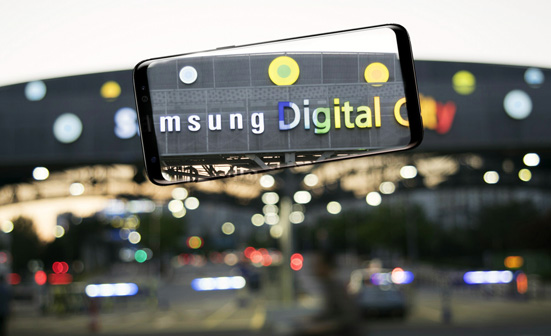Microsoft and Samsung transform building management
- July 20, 2020
- Steve Rogerson

Samsung and Microsoft aim to transform real estate and smart property management with a pilot collaboration to create an integrated portal for managing devices and smart appliances in buildings.
This collaboration combines smart appliances and digital cloud technologies, and aims to drive improved building operations and maintenance, and create better experiences for service technicians and residents.
This alliance, with pilots under development, brings together Microsoft’s Azure IoT platform and productivity cloud services with South Korean firm Samsung’s smart devices and SmartThings platform, to optimise building operations, equipment maintenance, energy management, asset performance and tenant experiences for commercial, hospitality and residential buildings as well as mixed-use developments.
The companies will leverage Samsung’s smart home appliances, HVAC systems and smart TVs integrated with SmartThings, together with Microsoft’s Azure digital twins technology and Dynamics 365 field service, to improve building maintenance and management by aggregating and analysing IoT data from building systems and connected appliances.
For example, with this capability building managers can not only create an integrated dashboard for handling building issues in real time but potentially before failure, saving time and resources.
The Azure IoT platform can process data messaging from millions of building sensors and devices and then use machine learning and AI to help building managers and operators determine what issues should be addressed in what order, and then link to Dynamics 365 field service to determine who is the right person, with the right skills, in the right location to resolve the issue. This helps reduce service calls while improving the productivity of service technicians who can now troubleshoot multiple issues on a single visit and, if needed, get remote assistance through the Microsoft Teams application.
This collaboration extends this capability to include Samsung smart appliances, HVAC systems and TVs, with plans to expand into digital signage equipment. The alliance also covers Samsung mobile devices, including the XCover Pro mobile phone, to improve experiences for frontline workers involved in handling building issues. Additionally, Samsung plans to offer SmartThings mobile development tools to enable builders to craft custom, tailored connected living experiences for their end users.
The collaboration will leverage data from Samsung’s smart refrigerators, washing machines, vacuums, air purifiers, ovens and other devices connected through the SmartThings platform. Such data integration allows building operators to monitor nearly all devices in real time, identify issues and take appropriate measures before real damage happens, should a problem occur.
“We believe collaboration with a key partner like Microsoft is essential for innovation, as the company shares our vision of inspiring the world to shape the future by innovating in technology and products,” said Chanwoo Park, corporate vice president at Samsung. “Providing building owners and operators with a robust and powerful set of tools to help them optimise their building costs and equipment, including the management of Samsung’s connected appliances and other devices, is paramount to our long-term alliance. Together with Microsoft, we are helping to solve real challenges faced by our customers by creating secure integrated insight and digital solutions that keep properties functioning sustainably and efficiently while providing better experiences for residents.”
In addition to bringing capabilities to the real estate and property management world, the companies have aligned their worldwide marketing, partner and sales programmes to deliver these integrations for their customers, including facilities management companies and real estate developers.
“With Azure digital twins, we can create comprehensive digital models of entire environments and a living digital replica of real-world things, places, business processes and people to help customers gain insights that drive better products, optimisation of operations, cost reduction and breakthrough customer experiences,” said Sam George, corporate vice president at Microsoft. “This collaboration with Samsung opens up new opportunities for further innovation in the real estate development and property management industries. Together, we’ll bring the best of Microsoft’s trusted, easy-to-use and secure Azure IoT platform, Azure digital twins and Dynamics 365 field service technology with Samsung’s expertise in connected devices and appliances to streamline building operations and maintenance.”
Oxford Properties, a real estate company in North America with operations in Europe and Australia, says this alliance has the potential to add high value for its customers.
“We are excited about the collaboration of Microsoft’s digital twins technology and Samsung’s range of connected devices, and the potential of these instruments to deliver meaningful new insights across the commercial real estate value-chain,” said Dean Hopkins, chief operating officer at Oxford Properties. “Investing in digital twins sets a foundation to unlock future opportunities. We are working with thought leaders around the world to advance the intelligence of our buildings and see enormous potential to positively impact building operations, asset management and customer experiences. Microsoft and Samsung coming together to accelerate the value that digital twins are bringing to the commercial real estate ecosystem is a great step forward.”
The National University of Singapore (NUS) will serve as a pilot under this alliance as part of its on-going efforts to create a smart, safe and sustainable campus for students and staff.
“NUS is very excited to work with Microsoft and Samsung in piloting smart building management on our campus,” said Yong Kwet Yew, senior vice president at NUS. “The experience gained from this trial could help us transform the way we maintain our buildings with predictive maintenance, enable better user experiences and create a smart campus ecosystem, and it has potential to scale up at the national level.”





